- Home
- Nancy Mitford
Don't Tell Alfred Page 7
Don't Tell Alfred Read online
Page 7
‘What is this all about?’ said Alfred, going over to join them. He too stood eyes to heaven, with his mouth slightly open. I followed him. The hall presented a scene like a picture of the Assumption: a mass of up-turned faces goggling at the stairs down which, so slowly that she hardly seemed to be moving, came the most beautiful woman in the world. She was dressed in great folds of white satin; she sparkled with jewels; her huge pale eyes were fixed, as though upon some distant view, over the heads of the crowd. Following her, two of my footmen were carrying a large gramophone; then came Mrs Jungfleisch, elegant in white linen, a basket on her arm. All the time, more guests were arriving. When Lady Leone got to the bottom of the stairs they divided into two lanes; she shook hands, like a royal person, with one here and there as she sailed out of the house for ever.
Chapter Six
CHARMING Northey, how to describe her? Can this creature of commedia dell’arte really have resulted from the copulation on a hard, brass, hotel bed, trains rumbling below, of dear old Louisa and terribly dull John Fort William? Some pretend that the place of conception, that of birth, and also the Christian name have a bearing on personality. Northey, product of King’s Cross and Hill View Clinic, Oban, and with that name, must be a living refutation of this theory. Nothing of the northerner about her, no vague mistiness, no moments of absence; she was not romantic nor did she yearn after the unknown. She was the typical product, one would have said, of an ancient civilization beneath cerulean skies. Impossible to believe that she had a Scotch father, old enough to be her grandfather, and Pictish ancestors; yet surely good Louisa – oh no, perish the thought! She was incapable of inventing such a wealth of detail to cover up a sin. I incline to think that Northey must have been a changeling; that carelessness occurred in Hill View Clinic, Oban, by which the child of some noble Roman lady and a strolling player was exchanged for Louisa’s brat. Physically she bore no resemblance whatever to the other Mackintoshes who all had solid frames, ginger heads and freckles. She was like a small exquisite figure in enamelled glass, with hair the colour of a guinea; her eyes the liveliest and most expressive I ever saw, not very large, brilliantly blue. In moments of excitement or distress they became diamond-shaped. When she talked she used her whole body in the concentrated effort of expressing herself, gesticulating, wriggling, as babies and puppies do. Her little thin hands never lay still in her lap. Furthermore, there was something indescribably lovable about her, she radiated affection, happiness, goodwill towards men. From the first moment we set eyes on her Alfred and I were her slaves.
She exploded into our household as we were dining alone together, tired and depressed, after the Dominions party. Davey had gone off saying that his friend the Marquis was now in Paris; it seemed that Philip was obliged to dine with his London stockbroker; both, I suspected, had really joined Lady Leone at Mrs Jungfleisch’s. I thought the party had been a total flop, though I heard afterwards that it was the most successful ever given at the Embassy in the sense that those who had missed it were wild with fury while those who had been present were sought after by the whole of Paris and supplied with free meals for weeks. But as Alfred and I could not discuss the great topic of the evening with our guests we were naturally the last people they wanted to talk to. They were longing to compare notes with others who had witnessed Lady Leone’s exit, to buttonhole newcomers who had not and tell them about it, above all to leave as soon as they decently could and get on to the telephone. Everybody was very polite; indeed I was finding out that diplomats are diplomatic, it is one thing you can say for them. After the frank and outspoken rudeness I was accustomed to in Oxford this made a pleasant change. There were, too, moments of encouragement as when somebody said, ‘Ah! The Irish Ambassador 1 That is a feather in Sir Alfred’s cap – he never came to the Leones.’
The Ambassador of the Channel Islands praised my carnations, a major export, so he told me, of his country. A marvellous-looking Othello of a man gorgeously draped in pale blue taffeta (slightly marred by boots sticking out below, as my walking shoes had stuck out from beneath the Chinese robe) had invited me to go lion shooting in his. But the party had had a restless undercurrent and was certainly not much fun for the hosts.
So now it was over and we were dining. All of a sudden Northey was there, in the doorway, an inquiring look on her face. ‘It’s me,’ she said.
‘Darling!’
‘I’m so sorry, I had to ask them to pay the taxi. No money at all. The station-master had to lend me a ticket. Yes I did, but I lost it.’
‘Nothing matters now you’re here. You must have had a beastly journey.’
‘Oh Cousin Fanny (oh, you are kind, may I really), oh Fanny –’ the soft skin of her forehead crumpled like tissue paper, her eyes took ona diamond-shaped, tormented expression which was to become very familiar to me and they brimmed. I saw exactly what Basil had meant about the brimming. ‘You can’t, you can’t imagine. There were sweet bullocks on board. You don’t know the sadness – the things they do to them. Their poor horns had been cut off – imagine the pain – and all because they get a pound more for them without horns and that’s because then they can pack them tighter. I’d like to drop a hydrogen bomb on Ireland.’
‘And kill millions of cows and all the birds and animals and the Irish also who are so charming?’ Alfred said, gently.
‘Charming!’
‘Oh yes, they are. They have to export these bullocks in order to live. They have no industries, you see.’
‘I hate and loathe and execrate them.’
‘Darling, you mustn’t be so worked up.’
‘But I must be. These little creatures are put in the world for us to look after them. We are responsible. How do we treat them? They don’t sleep you know, cows, they never have a moment of forgetting. Their comfort is to chew the cud – nobody feeds them properly on the journey – not enough water – fourteen hours in the train after the boat, with no water in this weather. And when they get to the – you know – dreadful place, does anybody give them water there?’
These things have worried me all my life; as I despise myself for not having the strength of character to do more than give an occasional pound to the R.S.P.C.A., I try to put them out of my mind.
‘Come and have your dinner, dearest.’
‘No, I couldn’t,’ she said, when the butler put a plate of consommé before her, ‘nothing made of meat – I won’t prey on them – never again.’
Alfred said, ‘But if nobody ate meat the whole race of cows and sheep and pigs would become extinct. They have happy little lives you know and death is never agreeable, it won’t be for us, either. It’s the price we all have to pay.’
‘Yes, but not torture. That’s too much. Fanny, do promise you’ll never have cruel food here.’
‘What is cruel food?’
‘For instance, lobsters and Irish horses and foie gras. A Frenchman on board told me what they do to sweet geese for pite de foie gras.’
‘Very wrong and stupid of him.’
‘He told to make me care less about the bullocks.’
‘This journey has been a nightmare. Now you must forget it.’
‘But if people always forget these things they go on and on. All right, I suppose I’m boring you.’
‘You’re not boring us,’ said Alfred, looking at her with love, ‘but we don’t like to see you so upset.’
‘But you understand why, don’t you? There we were, all travelling together – I used to go and chat to them, they looked so sad and good, poor little creatures – then I come to this lovely house and you, while they –’ she was eating the remains of a cheese soufflé now, evidently very hungry. ‘The captain of the Esmeralda,’ she said, with her mouth full, ‘was a most unpleasant person. He was ghastly to the bullocks and he offered to – you know – to hug me. But the sweet Frenchman who was there got me off.’
‘Weren’t there any women on board?’
‘Only me.’
‘And this Frenchm
an – he didn’t want to hug you himself?’
‘M. Cruas? He might have liked to but he didn’t offer. He is kind. So is the station-master. When we got on shore and I looked for my ticket, quelle horrible surprise – there it wasn’t. M. Cruas is poor, you know, so he couldn’t buy me one, he could only carry my luggage to save porters. So the station-master lent. Can we pay him back at once, Sir Alfred – oh you are kind, may I really? Alfred? He knows about us because Lady Leone never has a ticket, or any money, or a passport – just a basket he says. Sacree Lady Leone. Why sacred I wonder?’
‘It only means that blooming Lady Leone,’ said Alfred, in his falsetto.‘How’s your French, Northey?’
‘Very nice. M. Cruas is a teacher, so he taught me.’
‘Did you not learn it at school?’ An embarrassed, pouting wriggle was the answer to this. ‘You went to school, I suppose?’
‘I went. Only I didn’t stay.’
‘Why not?’
‘It was too dread.’
‘You’ll have to learn quickly you know or you won’t be any good to Fanny.’
‘Yes. I’ve thought of that. So M. Cruas will come here and go on with the lessons.’
Alfred said to me afterwards,’ Your cousin Louisa is a fool. Imagine letting that child go alone on a cattle boat and sending her to a school where she was so unhappy she had to leave. I’ve no patience with such people. The poor little thing seems to have been utterly mismanaged.’
Implacable where his own contemporaries were concerned, Alfred had infinite indulgence for the young; in fact I sometimes thought he was too much on their side – hoodwinked by them. It was plain to see that Northey would twist him round her little finger.
Presently Philip came in. Perhaps he felt sorry for us, all alone as he thought, dwelling on that horrid party. When he saw Northey, he said, ‘Don’t tell me, I’m going to guess. I suppose this must be the wonderfully efficient young lady who is going to make life easier for all of us? Northey, in fact. How d’you do? How was the cattle boat?’
Alfred and I began talking simultaneously to change the subject. Northey made a sad little noise like a kitten but went on eating; the food, and the sight of Philip (that, perhaps most of all, she was gazing at him as if she had never seen a young man before) seemed to be taking the edge off her sorrow.
‘This is Philip,’ I said, ‘he is busy, he mustn’t be put upon, but in real emergency you’ll find that he will come to the rescue.’
‘Each for each is what we teach,’ said Northey, looking at him from under her eyelashes. Oh bother, I thought, silly old love, again. Why does he have to be in it already, with Grace? Like all happily married people I am inclined to make matches; Philip and Northey seemed, on the face of it, such an ideal couple.
‘What would a real emergency be?’ she asked him.
‘Let me think. Well, if you invited the Tournons to the same dinner party as les faux Tournons, that would be a pretty kettle of fish.’
‘Please explain.’
‘There is a couple here called M. et Mme de Tournon – social butterflies, pretty, delightful, perfectly useless. They are the real Tournons. Then there are M. et Mme Tournon. He is a deputy, a brilliant young man who specializes in finance, hard-working, ambitious, a parliamentary under-secretary. His wife is a prominent physicist. In spite of the fact that he is almost bound to become Prime Minister, while she may well end up with the Nobel prize, they are known to the whole of Paris as the false Tournons. Now if you had the two couples here together, protocol would demand that the false Tournons, elected by the people, should take precedence of the others. Thereupon the real Tournons would turn their plates upside down and say, “il y a erreur”. I suppose you have understood every word? What a look! Never mind, in six months’ time all this will be second nature to you.’
‘You know, Philip,’ said Alfred, ‘I don’t wish to fill this house with the ornaments of society.’
‘No, sir. If I may be allowed to make an observation, all ambassadors begin by saying that. The fact is, however, that if you don’t have a sprinkling of them the others don’t care to come. By the way, I really looked in to tell you that Bouche-Bontemps has just telephoned. He wants to know if he can see you tomorrow.’
I liked M. Bouche-Bontemps very much, felt natural and at my ease with him. ‘He’s a dear,’ I said.
‘Yes. The old-fashioned kind – a jolly Roman Catholic. All the up-and-coming young men seem to be Protestants – makes them so priggish.’
‘I thought the old ones were free-thinkers?’
‘It’s the same as far as jollity goes.’
‘Let’s ask him to luncheon, shall we?’ I said.
‘Tomorrow? I don’t know if he could with this crisis impending.’
‘Of course, there’s a crisis. I’ve been too much occupied with our own to take much notice.’
‘All the same it might just suit him. I’ll go and see.’
‘What crisis?’ said Northey, following him out of the room with her eyes.
‘One of your duties here will be to read the papers,’ said Alfred.’ You can read, I suppose?’
‘I can read and I have a certain native intelligence. Don’t be sarcastic with me, I beg.’
‘Well, then, there’s a parliamentary crisis going on and it looks as if this government may fall.’
‘Then there’ll be a general election? You see, I know about politics.’
‘The point is that there will not. Fanny must give you some books to read about the state of France.’
Philip came back and said the Foreign Minister would be very much pleased to lunch, but he had business to do with the Ambassador and must see him alone.
‘Northey and I can eat in the Salon Vert,’ I said, ‘and you can have your secrets in the upstairs dining-room. But do bring him in for a cocktail first, if you think he has time.’
‘They always have time in the middle of the day,’ said Philip. ‘They can be up all night and start intriguing again before breakfast but the hours between one and three are sacred. That’s why they are all so well – one never hears of a French politician dying – they live for ever, haven’t you noticed?’
‘I’ve come to say good-bye,’ said Davey, arriving with my tray in the morning.
‘Davey, don’t go. It’s so comfortable to feel you’re here. Why don’t you stay on in some capacity – comptroller? I think Major Jarvis is leaving us. Take his place – oh do!’
‘Sweet of you, Fanny, but I couldn’t live with the French. I understand them too well. Besides, I have fish to fry at home. New curtains for the drawing-room. And I can’t live for ever without Mrs Dale. Tea-time at home is delightful – blinds are drawn at the witching hour of 4.30 and I have her on the wireless.’
‘We’ve got a wireless; you can have her here.’
‘I’ve tried. She doesn’t sound the same.’
‘I wanted you to see Northey.’
‘I have. We had our breakfast together just now. Rocks ahead there. So, I’m off. When you’re next in trouble send for me, won’t you? See you very soon in that case.’
When the Foreign Minister saw Northey he said we must all lunch together. He could do his business with Alfred in two minutes on his way out – he had never meant that the charming Ambassadress should be excluded from their talk. Mees Nortee was no doubt aware that her job demanded enormous discretion and indeed he could see by her face that she was a serious woman. During luncheon he addressed himself to her in a tender, avuncular, bantering tone of voice.
‘So you are studying French. But why? Everybody here speaks English. And reading books on the state of France by English experts? I know these experts. They are all in love with Arabs.’
‘No,’ said Alfred firmly,’ respectable, married men.’
‘The English who specialize in French affairs fill me with misgivings. Why are there so many of them and why must they concentrate on my poor country – are there no others in the world whose state is worth
considering? Why not the state of Denmark for a change?’
‘You ought to be flattered,’ said Alfred. ‘The publishers know they can sell any amount of books about France – in fact France, like Love, is a certain winner on a title-page.’
‘Ah! So Mees Nortee is to learn about France and Love. I shall teach her, I know more than the English experts.’
‘You are kind,’ said Northey, ‘because I can see that these books are a bore. No pictures, no talk and such terribly long sentences.’
‘You told me you could read,’ said Alfred.
‘Like all of us she can read what interests her. When you have been here for a year, Mees, you will probably find yourself enjoying books about the state of France – though what this state will be by then, who can say?’ He sighed deeply. ‘Now, we will begin our lesson. Your uncle, the Ambassador here, has two bones to pick over with the French government, whenever there is a government. There are Les lies Minquiers, a very nice point. You will hear more of them in due course – hats off to the Intelligence Service! And there is the European Army, known as C.E.D. or E.D.C., nobody can ever remember why. One of your uncle’s assignments is to persuade us to merge our army, which is overseas, fighting, with that of the Germans which is non-existent. This merging is desired by the Americans who see everything in black and white – with a strong preference for black.’
‘M. le Ministre –’ said Alfred sharply.
‘Your protest is registered, M. l’Ambassadeur. The English are really indifferent, they don’t care, but whenever they can please the Americans without it costing anything they like to do so. Armies have never meant much to them in times of peace – one army – another army – zero they think, anyhow, in the face of the Bomb. At the same time they have never been averse from weakening the Continental powers. All their Generals and Field-Marshals tell them that a European force would be quite unworkable so they say come on, the Americans want it, it rather suits us, let’s have it. Now, if it were a question of commerce, M. l’Ambassadeur, I believe the nation of shopkeepers would sing a very different song? Suppose we wanted a European market, Excellency, what would you say to that?’

 The Blessing
The Blessing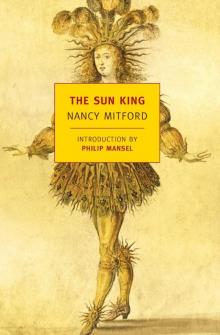 The Sun King
The Sun King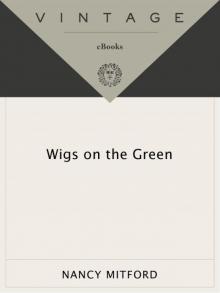 Wigs on the Green
Wigs on the Green Love in a Cold Climate
Love in a Cold Climate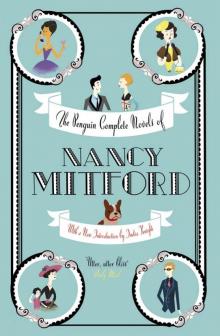 The Penguin Complete Novels of Nancy Mitford
The Penguin Complete Novels of Nancy Mitford The Pursuit of Love
The Pursuit of Love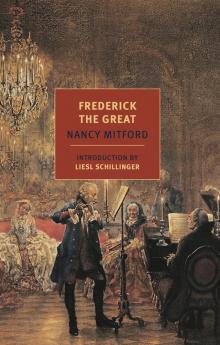 Frederick the Great
Frederick the Great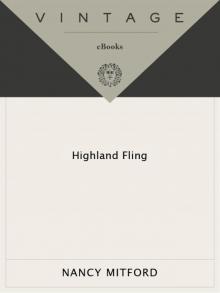 Highland Fling
Highland Fling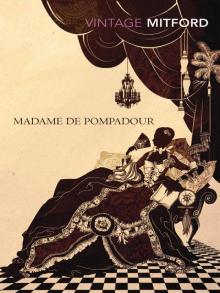 Madame de Pompadour
Madame de Pompadour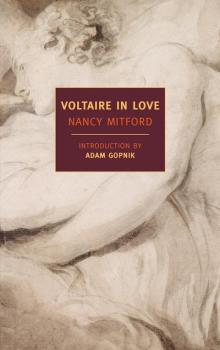 Voltaire in Love
Voltaire in Love Don't Tell Alfred
Don't Tell Alfred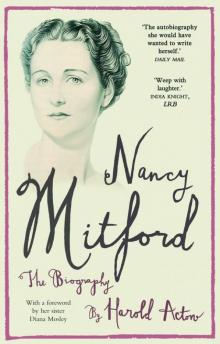 Nancy Mitford
Nancy Mitford Christmas Pudding and Pigeon Pie
Christmas Pudding and Pigeon Pie